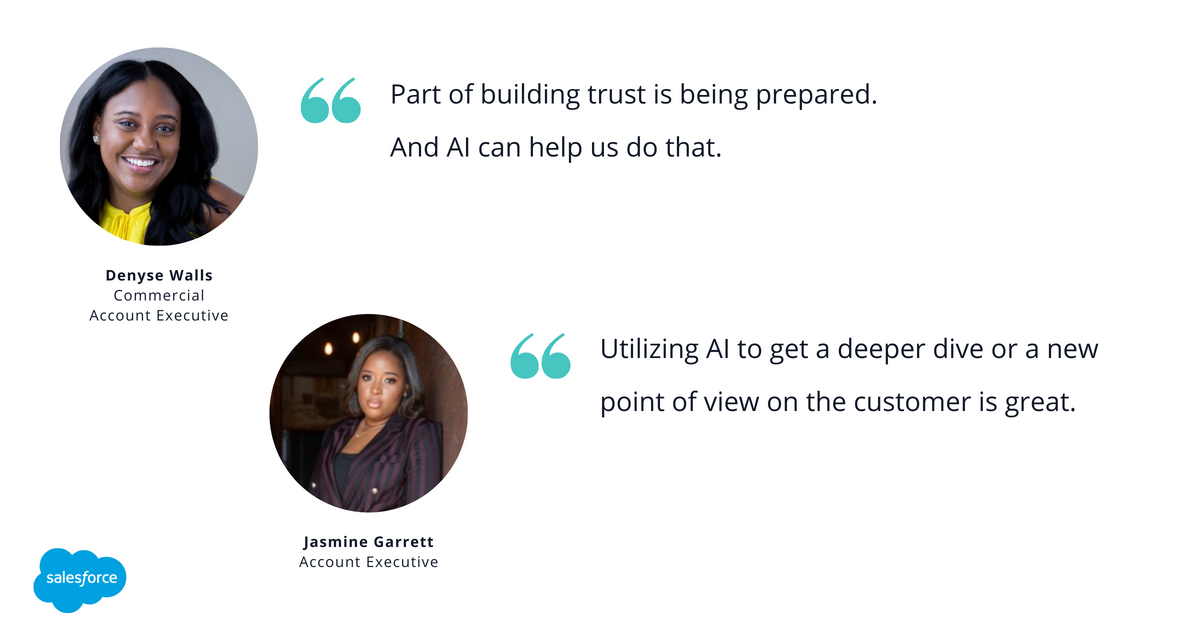The intersection of human connection and connecting-edge technology continues to shape the sales industry, and never more so than during the age of AI.
At our Sales Strategy Summit, we invited Salesforce’s Denyse Walls, Commercial Account Executive, and Jasmine Garrett, Account Executive, to take us behind the scenes of how AI complements their sales approach — and when it doesn’t.
Relationship-based selling meets AI
Since AI entered the scene, relationship-based selling has taken on new forms for both Denyse and Jasmine.
“Relationship-based selling is about building rapport, providing value, and building long-term trust,” says Denyse, highlighting how these are all human characteristics. “But part of building trust is being prepared. And AI can help us do that, right? We can collect information, we can become more productive, and only then do we have conversations with our customers to build trust and add value.”
For Jasmine, authenticity is another key pillar of relationship-based selling. She steers away from scripted narratives and listens to each customer’s needs — with the added help of AI research.
“Business can be transactional sometimes, but your relationship with the customer should not be,” Jasmine points out. “That being said, utilizing AI to get a deeper dive or a new point of view on the customer is great. For example, understand that if they're doing ‘X, Y, Z,’ how do our solutions align with that? What are the top four things AI would recommend to them?”
A closer look at the AI toolbox
At Salesforce, Denyse and Jasmine tap into a suite of AI tools to augment their sales processes.
In Denyse’s AI toolbox is Einstein for Sales, the world's first generative AI solution for CRM built natively into Sales Cloud.
“I like to write my own messages, but I'll go to Einstein and say, ‘Hey, could you do a final look, just in case?’ It’s like an extra assistant for proofreading.”
Jasmine also embraces Einstein to help her ideate sales messaging and proofread her emails.
“I’m the type of person that moves a mile a minute, so I’m bad at proofreading,” she laughs. “Einstein helps me tremendously in regards to checking my emails as well as formulating emails quickly when my brain is on pause. You know, when you need to send out five emails quickly before the end of the day, but you're thinking about 15 other things. Those prompts within Salesforce have been extremely helpful for me.”
As someone with dyslexia, Denyse also finds that tools like Grammarly, a typing assistant, put her at ease, knowing she can focus on what she does best — relationship-building — while AI checks the syntax.
Keeping the human in the selling process
While sales coupled with AI can lead to a powerful synergy, both Denyse and Jasmine stress the importance of maintaining a human touch.
“For example, you can Google anything, right? You can Google: ‘Why do I need this Salesforce product? What is this product going to do for me?’ But it’s very general. When it comes to person-to-person selling, it goes back to the partnership and understanding strategically what your customer needs,” explains Jasmine. “What’s the North Star? What are their goals? That way, you can tie your product or solution back to their core values.”
Denyse adds how people need to navigate AI-generated responses with caution. “With ChatGPT, it will never say ‘no’ to you,” she laughs, “so it can lead you astray. Use discretion and understand that this is just one layer of your research.”
In short, AI does not replace people; it enhances their capabilities.
“AI cannot see a person in the room and see how they’re responding to your messages,” Denyse says. “They can’t see an eyebrow go up or look around to read the person-to-person interaction. They can’t be at a client dinner with you. So we have to understand AI’s place — and people aren’t going away in that process.”
For more insight into how Denyse and Jasmine are utilizing AI to augment their sales strategy, listen to the full conversation, “Beyond Automation: How to Humanize Sales in an AI World,” here.
You can also join Salesforce’s Talent Community to stay connected to career opportunities and follow Salesforce Jobs on Twitter, Instagram, and LinkedIn.


